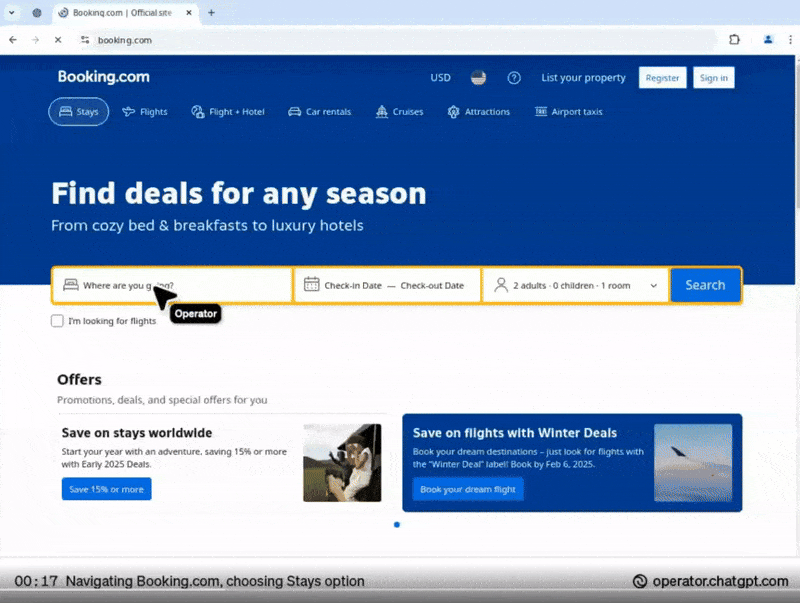
The new existential threat to real estate portals now has a name.
Up until the last few weeks, there had been plenty of talk about AI disrupting real estate search in the same way the internet dispensed with print. But the chatter at industry conferences tended to be nebulous with commentators all imagining different consumer champions to take the threat to portals from scrappy challenger marketplaces to agent websites.
At the end of January OpenAI released its Operator product shortly followed by the release of the Deep Research product. These innovations have offered the general, internet-going public a glimpse of the future and have perhaps provided the global real estate marketplace industry with two words around which its fears can now coalesce: agentic search.
'Agentic search' conjures an image of users choosing to search through hundreds of real estate agent websites instead of going straight to their favourite real estate portal brand. While that isn't where the name comes from, it isn't a bad encapsulation of the potential threat to real estate marketplaces.
Until now, talk of an AI threat has centred around internet search engines like ChatGPT and Gemini. They're new, sometimes link to portal listings pages rather than the 'money' results pages, and often give agent sites more priority in the results they serve than Google would.
However, the typical ChatGPT user searching for "four-bedroom houses in Oakland with a basement and a double garage for under $800,000" was never truly a threat to the portal-dominated status quo; it was just a new source of referral traffic and perhaps a headache around how to go from charging agents for results page positioning to charging them for performance (leads).
As ChatGPT will tell you, its real estate searches prioritise portals over agent websites in the results it serves "because they aggregate listings from multiple agents and update frequently." However, the user still clicks through to a portal website more often than not and still converts to a lead there.
Agentic search is different and goes a step further. It can take that all-important lead out of the hands of the portal intermediary. Simply put, agentic search is not about finding something, it's about doing something.
Consider the difference between these two prompts:
"Find me four bedroom houses in Bristol with a south facing garden and off street parking for under £600,000"
"Find me the best four bedroom houses in Bristol with a south facing garden and off street parking for under £600,000 and then book viewings for this weekend."
There's a lot of clicking around on a real estate portal that's been saved with the second one and there's no guarantee that the booking engine used will be on a portal or on an agent's own website.
These are the earliest days of public-facing agentic internet search and the language chosen to accompany the launch of Operator (the most relevant product for this story) is wary and tempering.
Operator can take a very demanding, complex set of instructions and get the job done. It uses a new model called Computer-Using Agent (CUA) to see, interact and self-correct and if it gets stuck it hands control back to the human user.
Early demonstrations have already had LinkedIn commentators gushing and it's likely to go from impressive to amazing to normal in no time at all.

Above: OpenAI's Operator using Booking.com to book a trip to South Korea.
OpenAI is not just circumspect in its product description and is rolling out cautiously only making Operator available to Pro subscribers in the US for now.
As with every other AI innovation over the last couple of years though, you can be sure that prices will come down, availability will go up, you'll get unsolicited demonstrations from colleagues and there will be Chinese copycats in no time.
When considering the potential impact of agentic search on real estate portals, there are some very important and valid "yes, but..." statements that need to be addressed.
People may not trust an AI bot to do their house-hunting for them. In fact, house hunting is an activity that most human beings enjoy.
There's also the question of the adoption curve here. Even if we assume that some people will eventually trust an AI agent to perform a complicated, life-changing task that they actually enjoy doing themselves, how long until enough people do it this way to affect portal business models?
We might look to the adoption of AI internet search for a parallel here.
By anyone's best guess, the current market share of internet searches performed by the likes of ChatGPT, Gemini and Perplexity is maybe 6% in the US. The extrapolations for when it hits critical mass (usually thought to be between 15-18% in any given market) vary wildly.
Interestingly though, AI internet search's market share for transactional searches is far smaller, thought to be perhaps only 3%.
Certainly, the general public will be getting Operator to order their lunch years before asking it to book an appointment to view their dream home.
Agentic search will come for the tedious tasks first but it won't stop there. At some point in the not-too-distant future, there will be third-party AI-driven bots house-hunting on portals and agent websites.
Real estate marketplace companies worried about how to think about this need look no further than OpenAI's product announcement page.
The tech company is actually collaborating on Operator's development with many prominent marketplace operators. Instacart, Uber and Doordash are all sites that might be considered a chore for some. Interestingly though, there are also partnerships with TripAdvisor and Booking.com.
People enjoy booking holidays! Why would Booking.com want to collaborate with this product unless it thought that eventually, some people might give up the task to AI?
Booking.com doesn't appear to be scared of the prospect of a third-party product coming between its users and its platform and it isn't about to completely overhaul its famously filter-heavy UI as an overreaction to a perceived threat.
Sure, Operator could comb through all the hotel websites out there and sidestep the intermediary to book a vacation but it probably won't, for two reasons...
Above: The PPW Pod discusses agentic search with ModelProp founder, Mal McCallion
Not only is it easier (and uses less, expensive processing power) for the bot to use Booking's platform as a default but Booking.com also has a relationship with the bot's master. OpenAI doesn't want to make enemies of marketplace sites around the world. Why would they?!
Can you imagine a scenario where Operator starts taking leads away from News Corp-owned Realtor.com and Rupert Murdoch ends up shouting down the phone at Sam Altman saying he's violated the partnership between the two companies? Seems unlikely.
By partnering with OpenAI, Booking.com has ensured that Operator is trained first on its website and its lead generation forms. It has not only formed a relationship with the company in charge of the bot, but it has also made sure that the bot will consider its website the easiest way to book a holiday.
Just as the best information always wins in search, in lead generation the path of least resistance will always win.
The solution to the initial threat posed by basic AI internet search was to make sure that you, the portal, had the most accurate, rich and up-to-date version of each listing.
The agentic search insurance policy is to make sure that your platform has the richest, most complete inventory and is the easiest place to book a viewing. It also can't hurt to have a relationship with the company making the agentic search agent.
Just because AI can search through all the real estate agent websites and use all their lead-gen and viewing booking forms, doesn't mean that it wants to. There is still inherent value in being the source of truth, aggregating the market and making things easy.